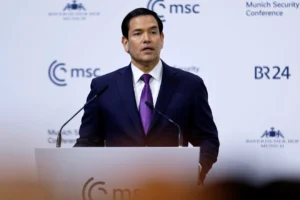Key Impact Points:
- Morgan Stanley pulls back on plastics initiative: The bank quietly dropped its financing goal for plastic pollution cleanup, reflecting a broader shift away from sustainability commitments.
- CEOs shift focus away from ESG: Inflation, AI, and geopolitics have overtaken ESG initiatives as top priorities for CEOs, per a Bain & Co. survey.
- Political pressure impacts sustainability efforts: Growing ideological divides and right-wing opposition have made discussing ESG more challenging for companies.
Wall Street Quietly Retreats from Sustainability Commitments
Last week, Morgan Stanley quietly shelved a key pillar of its sustainability strategy: a commitment to finance plastic pollution cleanup. Instead of openly discussing the challenges it faced or sharing the lessons learned over five years, the investment bank went silent. The news of this change emerged only after Bloomberg Green asked why Morgan Stanley’s latest ESG report lacked mention of its Plastic Waste Resolution, once a hallmark of its sustainability initiatives.
This shift is emblematic of a broader trend in corporate sustainability, which has faced mounting pressure from right-wing opposition and the challenges of lingering inflation and elevated interest rates. Once seen as an asset, ESG (Environmental, Social, Governance) is now considered a liability by many executives wary of backlash.
Sustainability No Longer a Top Priority for CEOs
A recent Bain & Co. survey highlights this change, showing that sustainability has dropped down the list of priorities for CEOs, who are now more focused on inflation, artificial intelligence, and geopolitics. As a result, many companies are scaling back their public discussion of ESG initiatives. A Bloomberg Intelligence analysis found that most U.S. companies have significantly reduced mentions of ESG during quarterly earnings calls.
Change the World - Subscribe Now
For some companies, particularly those struggling to meet ambitious targets, the temptation to remain silent has grown. Adam Matthews, chief responsible investment officer at the Church of England Pensions Board, remarked on the increasing difficulty in addressing the complexities of the energy transition in a divided political landscape. He emphasized that companies need the time and space to perfect their strategies without being criticized at every misstep.
The Complexity of Achieving ESG Goals
Matthews argues that the low-carbon transition—the central focus of many sustainability initiatives—requires a “multi-decadal re-engineering” of the global economy. This complex process demands constant recalibration, as companies learn from evolving data and changing circumstances. While strategies will inevitably evolve, Matthews cautioned against lowering the bar for ESG efforts.
Others agree. James Vaccaro, chief catalyst at the Climate Safe Lending Network, stressed the need for companies to be honest about the challenges they face in achieving ESG goals. He urged businesses to provide updates on their progress, helping others learn from both their successes and failures. Currently, however, the fear of public criticism is so high that many companies remain silent rather than risk being called out.
Related Article: Is It Too Soon to Sunset ESG?
Stakeholders Want Transparency
For Sherry Madera, CEO of CDP (a nonprofit focused on environmental impact), companies must go beyond simply stating their end goals. Stakeholders now demand details about the steps companies plan to take to get there. They want to understand the journey as well as the destination.
The Struggle for Sustainable Finance
Even in Europe, where sustainability is more ingrained in corporate strategies, companies face challenges. TotalEnergies CEO Patrick Pouyanne pointed out that the pressure on asset managers to prioritize ESG standards has limited the company’s stock performance compared to U.S.-based Exxon Mobil, which has pursued an aggressive oil and gas strategy, yielding greater investor rewards.
This contrast highlights the tension between sustainability commitments and financial performance, leaving many companies, like Morgan Stanley, quietly stepping back from their ESG promises.

 Follow SDG News on LinkedIn
Follow SDG News on LinkedIn











